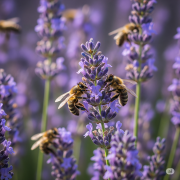Introduction to Bees
Bees are small, flying insects that play a huge role in nature and agriculture. There are over 20,000 species of bees around the world, but the most well-known is the honey bee. Bees are best known for making honey, but their most important job is pollination—helping plants grow, reproduce, and produce food.
Bees visit flowers to collect nectar and pollen, which they use for food. In the process, they transfer pollen between flowers, allowing fruits, vegetables, and seeds to grow. This makes bees essential for both ecosystem health and food production.
The Importance of Bees to Ecosystems and Human Health
See the following statement below that shows the essence of bees to the environment and wellbeing:
Bees as a Promoter of Biodiversity
 Pollination supports the survival of many native plants and wildflowers. Many birds, insects, and mammals take advantage of the pollination of around 80% of wildflowers in Europe.
Pollination supports the survival of many native plants and wildflowers. Many birds, insects, and mammals take advantage of the pollination of around 80% of wildflowers in Europe.
Connection to Human Health
A healthy ecosystem can be possibly achieved through pollination, which provides a diverse food supply in return. This includes the production of fruits, veggies, and nuts that are all crucial sources of human nutrients. Moreover, bees also have a good impact on plant life, from soil health, clean air, to medicinal plants.
The Essence of Community Actions
Experts at helpsavebees.co.uk encourage the community to take environmental actions.
- Avoiding the use of pesticides
- Creating bee homes
- Providing water supply
When the summer heat strikes, it is a good solution to establish shallow water stations that include landing pebbles. This approach may benefit the cooling down of hives and hydrating the bees.
End Notes
Honey production is the main function of bees, but they also help maintain the planet through the process of pollination. It is a complex process that may be very helpful in agriculture, biodiversity, and human health. Awareness of bee importance and some basic bee-friendly things to do may support the longevity of bee existence.
